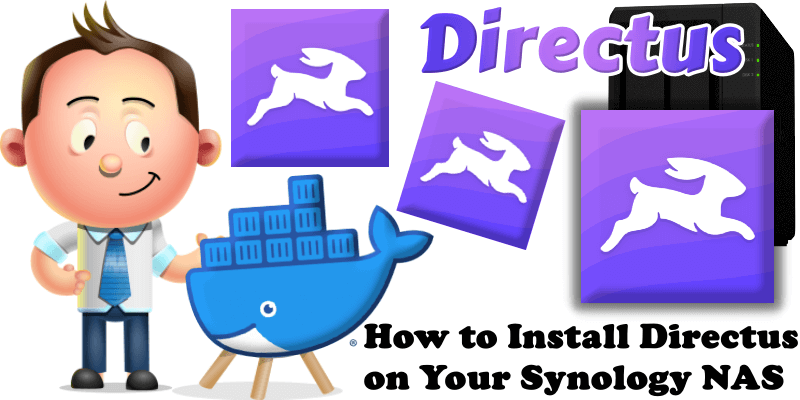
Directus is a real-time API and App dashboard for managing SQL database content. This platform provides everyone on your team, regardless of technical skill, equal access to data and digital file asset management, for any data model or project. First, link Directus to your desired SQL database and file storage adapter. After that, Directus enables you to perform CRUD operations, create users, assign roles with fully configurable permissions, build complex and granular queries, configure event-driven webhooks and task automation… the list goes on! In this step by step guide I will show you how to install Directus on your Synology NAS using Docker and Portainer.
STEP 1
Please Support My work by Making a Donation.
STEP 2
Install Portainer using my step by step guide. If you already have Portainer installed on your Synology NAS, skip this STEP. Attention: Make sure you have installed the latest Portainer version.
STEP 3
Make sure you have a synology.me Wildcard Certificate. Follow my guide to get a Wildcard Certificate. If you already have a synology.me Wildcard certificate, skip this STEP.
STEP 4
Go to Control Panel / Login Portal / Advanced Tab / click Reverse Proxy. Follow the instructions in the image below.
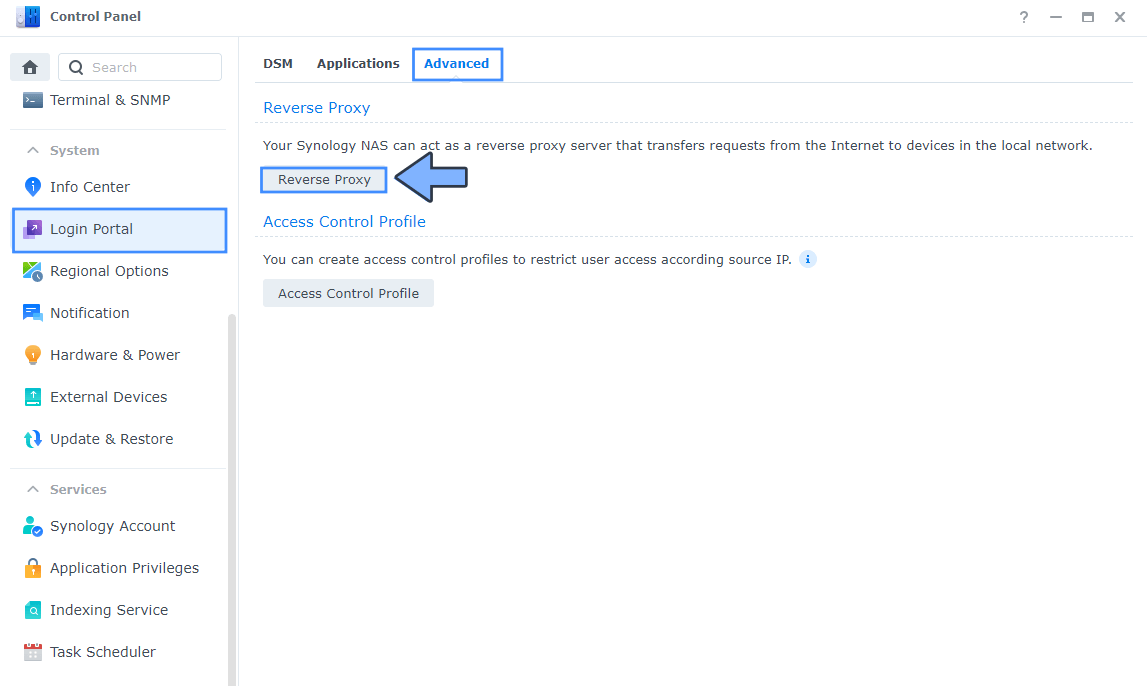
STEP 5
Now click the “Create” button. Follow the instructions in the image below.
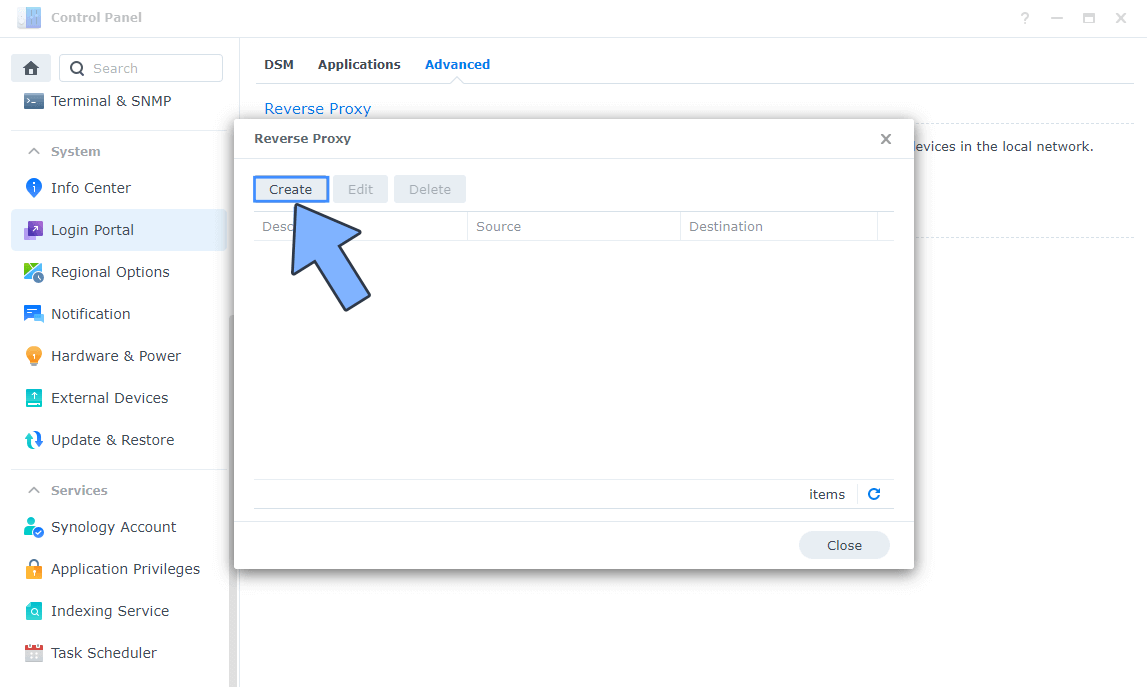
STEP 6
After you click the Create button, the window below will open. Follow the instructions in the image below.
On the General area, set the Reverse Proxy Name description: type in Directus. After that, add the following instructions:
Source:
Protocol: HTTPS
Hostname: directus.yourname.synology.me
Port: 443
Check Enable HSTS
Destination:
Protocol: HTTP
Hostname: localhost
Port: 8055
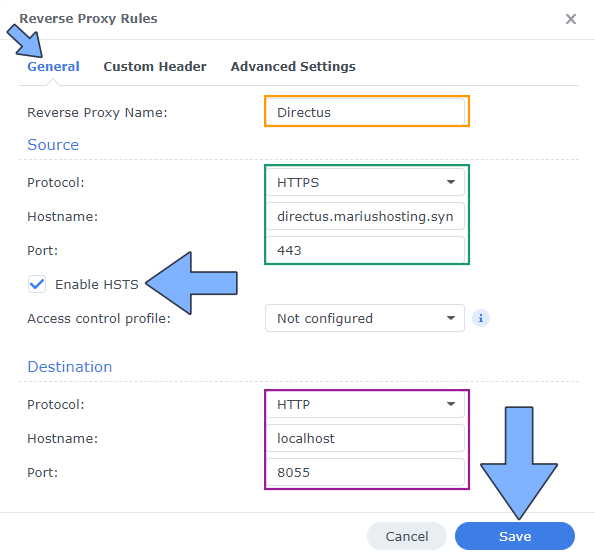
STEP 7
On the Reverse Proxy Rules click the Custom Header tab. Click Create and then, from the drop-down menu, click WebSocket. After you click on WebSocket, two Header Names and two Values will be automatically added. Click Save. Follow the instructions in the image below.

STEP 8
Go to Control Panel / Network / Connectivity tab/ Check Enable HTTP/2 then click Apply. Follow the instructions in the image below.
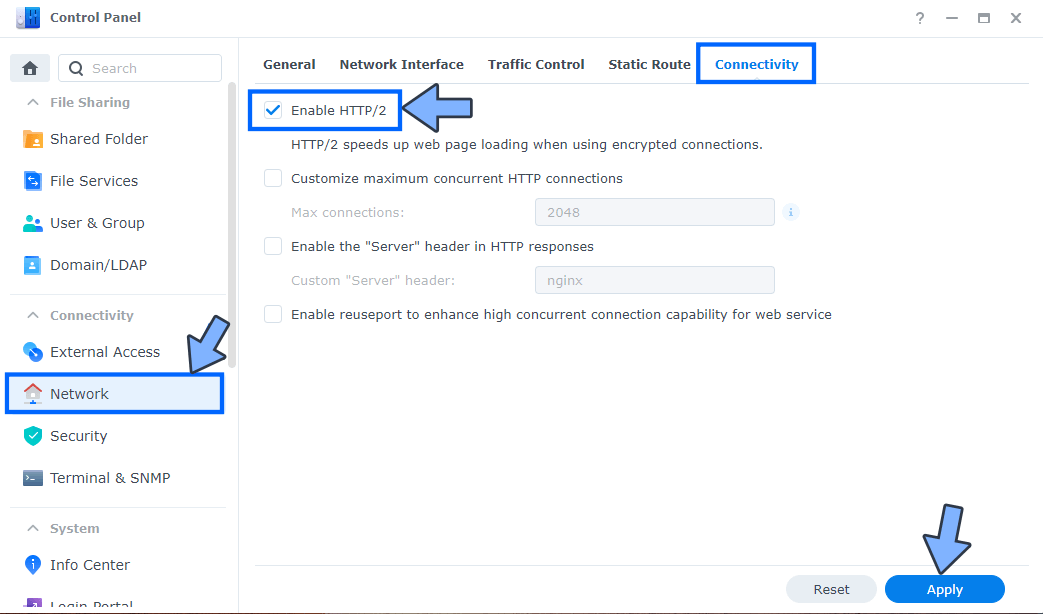
STEP 9
Go to Control Panel / Security / Advanced tab/ Check Enable HTTP Compression then click Apply. Follow the instructions in the image below.
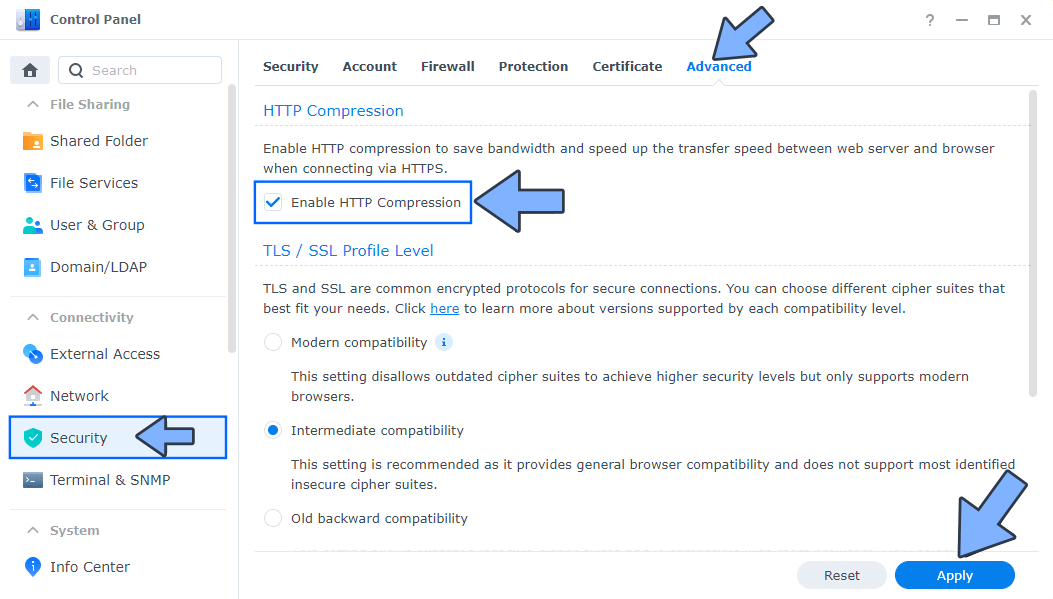
STEP 10
Go to File Station and open the docker folder. Inside the docker folder, create one new folder and name it directus. Follow the instructions in the image below.
Note: Be careful to enter only lowercase, not uppercase letters.
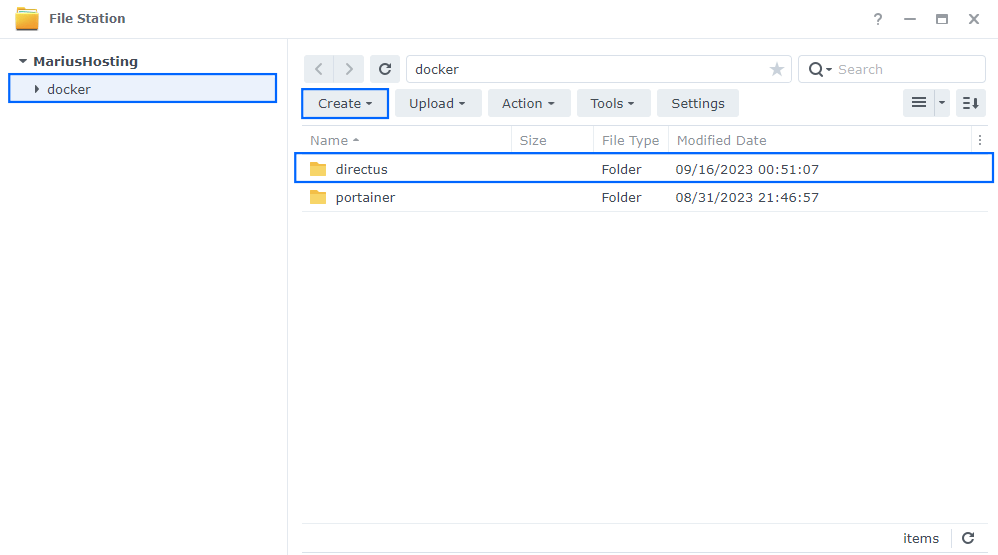
STEP 11
Now create four new folders inside the directus folder that you created at STEP 10 and name them db, extensions, redis, uploads. Follow the instructions in the image below.
Note: Be careful to enter only lowercase, not uppercase letters.
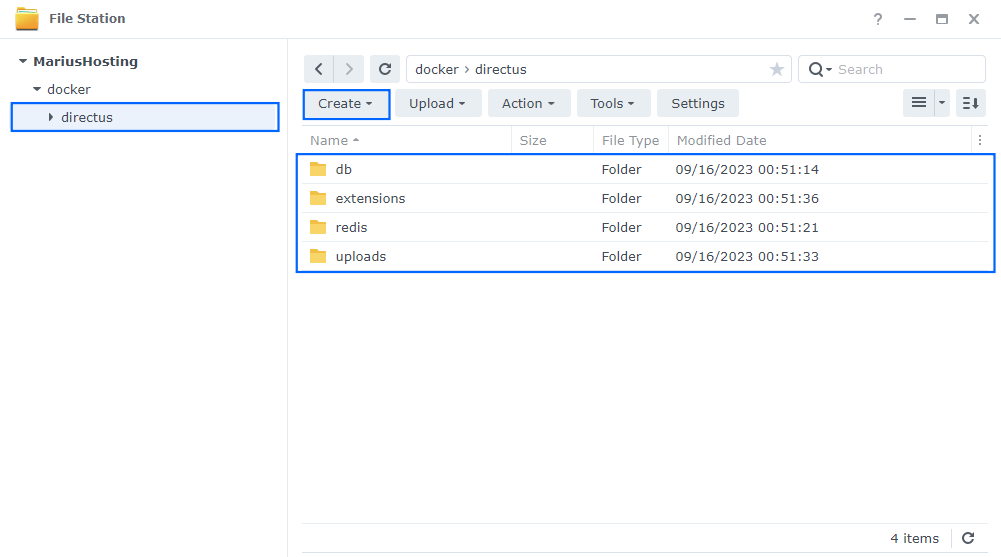
STEP 12
Right click on the directus folder that you have previously created at STEP 10 then click Properties. Follow the instructions in the image below.
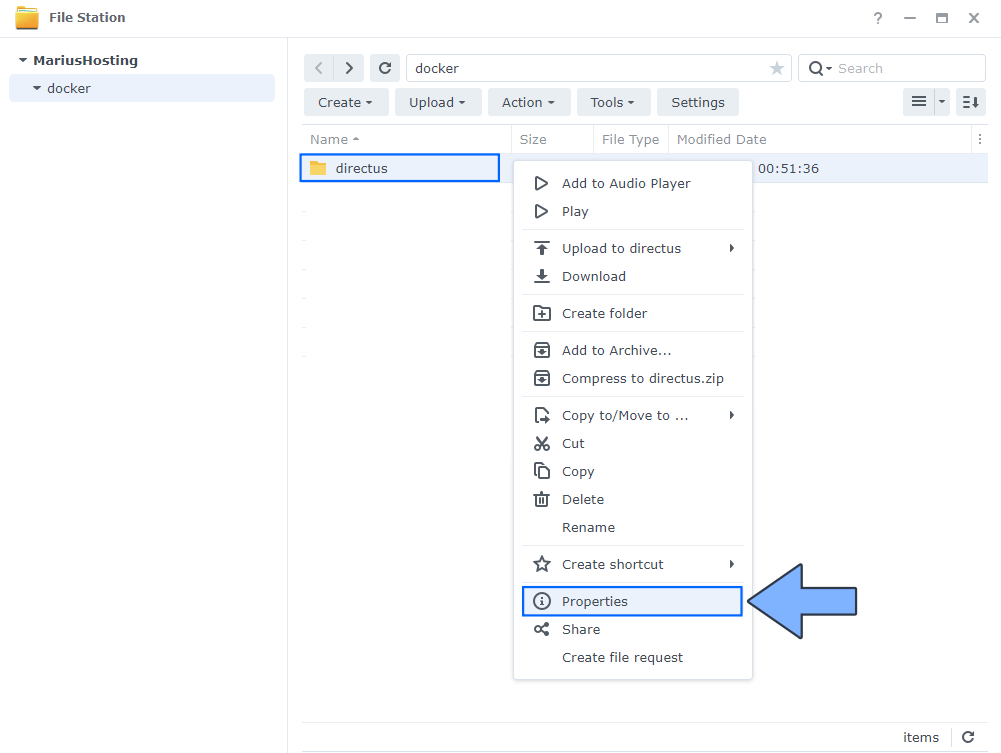
STEP 13
Go to the Permission tab then click Advanced options. From the drop-down menu choose “Make inherited permissions explicit“. Follow the instructions in the image below.
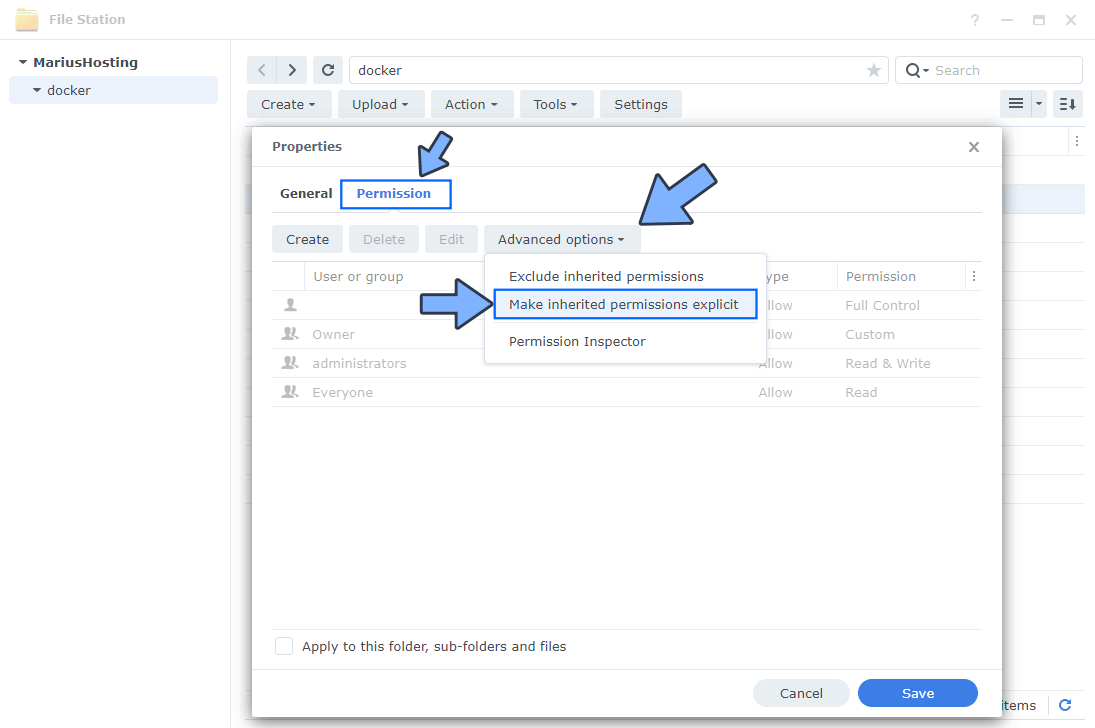
STEP 14
Select Everyone then click the Edit tab. Follow the instructions in the image below.
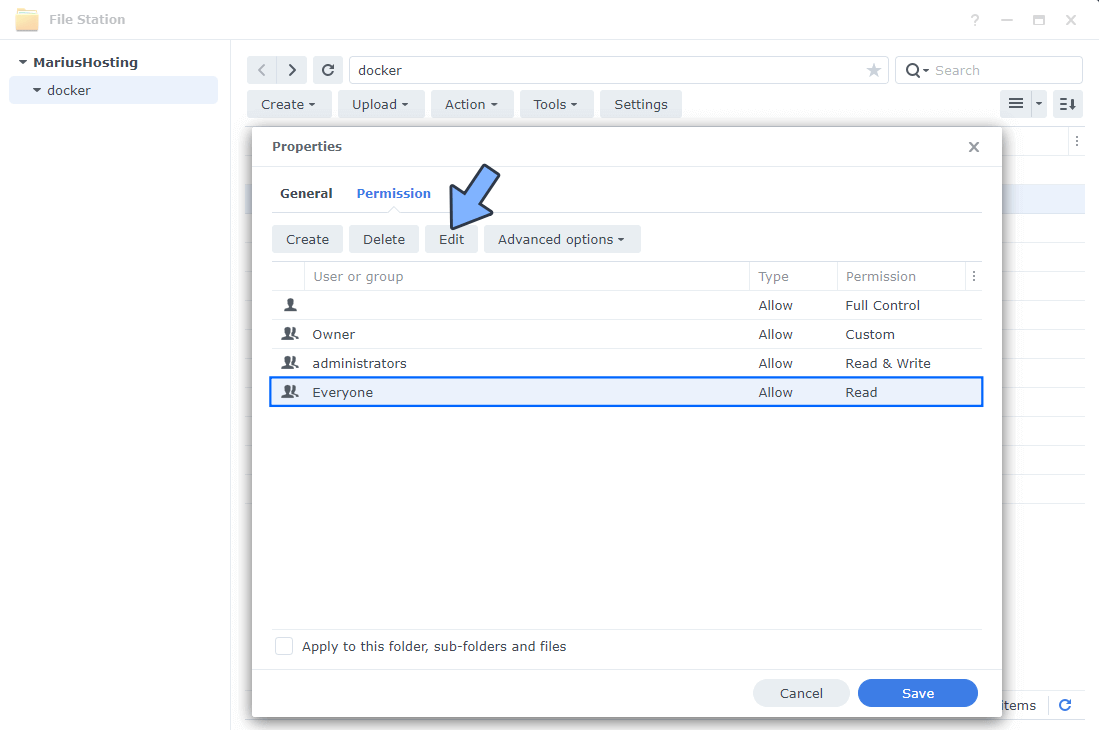
STEP 15
Check all Read and Write Permissions. Click Done. Follow the instructions in the image below.
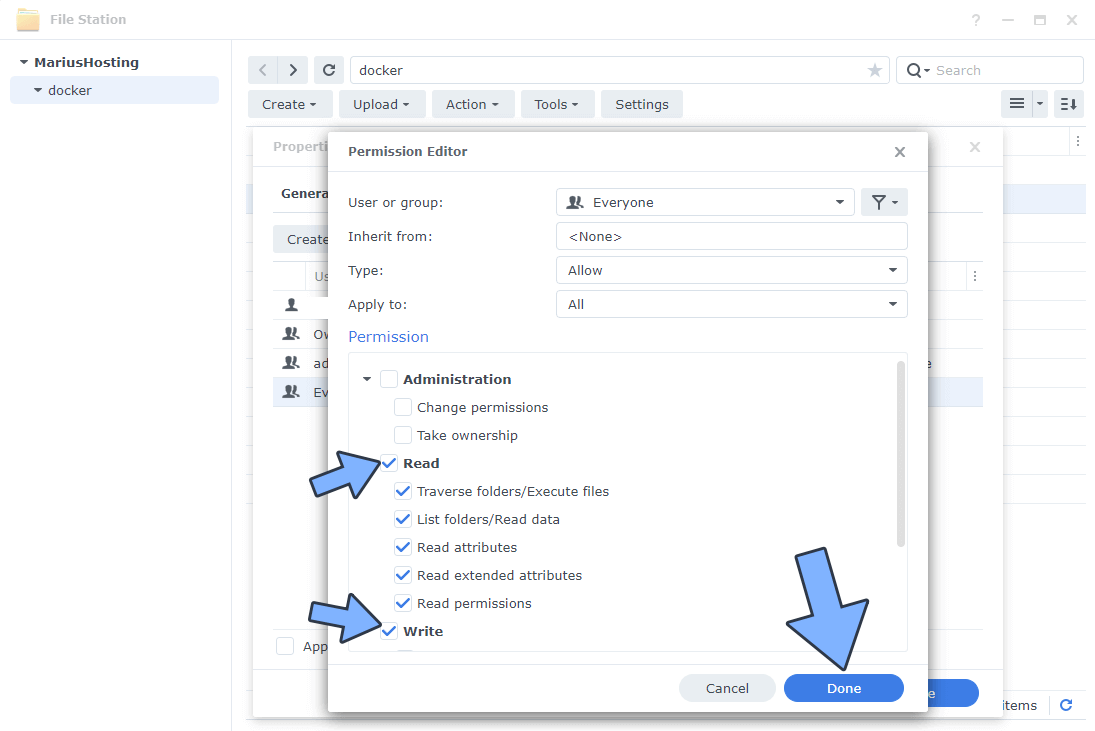
STEP 16
After you click Done on STEP 15, check “Apply to this folder, sub-folders and files“. Click Save. Follow the instructions in the image below.
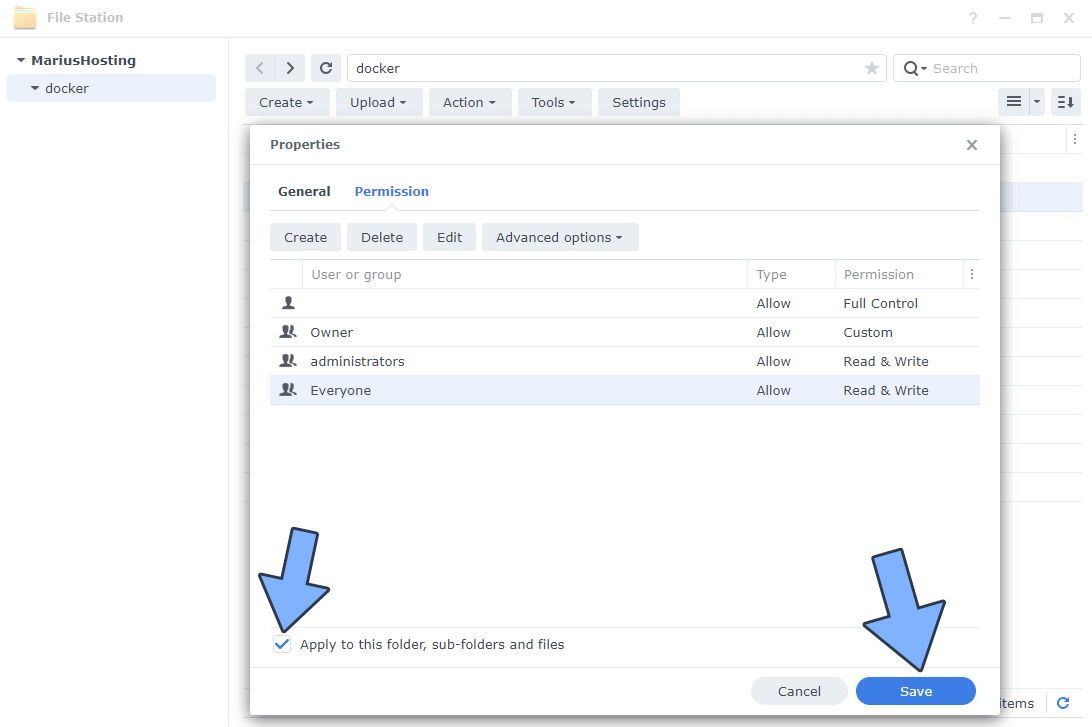
STEP 17
Log into Portainer using your username and password. On the left sidebar in Portainer, click on Stacks then + Add stack. Follow the instructions in the image below.
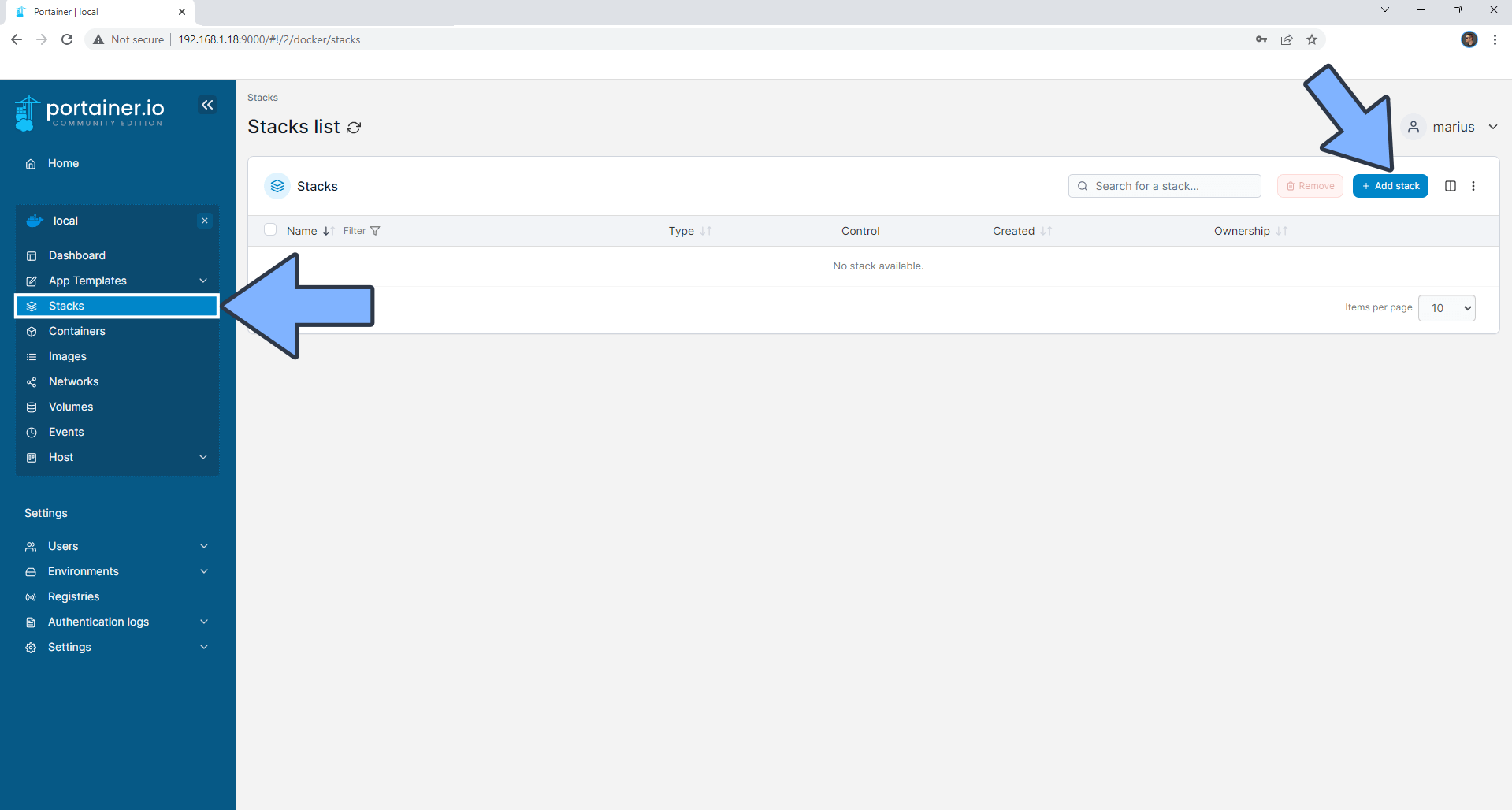
STEP 18
In the Name field type in directus. Follow the instructions in the image below.
version: "3.9"
services:
redis:
image: redis
command:
- /bin/sh
- -c
- redis-server --requirepass redispass
container_name: Directus-REDIS
hostname: directus-redis
mem_limit: 500m
mem_reservation: 256m
cpu_shares: 768
security_opt:
- no-new-privileges:true
read_only: true
user: 1026:100
healthcheck:
test: ["CMD-SHELL", "redis-cli ping || exit 1"]
volumes:
- /volume1/docker/directus/redis:/data:rw
environment:
TZ: Europe/Bucharest
restart: on-failure:5
db:
image: postgis/postgis:15-master
container_name: Directus-DB
hostname: directus-db
mem_limit: 1g
cpu_shares: 768
security_opt:
- no-new-privileges:true
user: 1026:100
healthcheck:
test: ["CMD", "pg_isready", "-q", "-d", "directus", "-U", "directususer"]
timeout: 45s
interval: 10s
retries: 10
volumes:
- /volume1/docker/directus/db:/var/lib/postgresql/data:rw
environment:
POSTGRES_DB: directus
POSTGRES_USER: directususer
POSTGRES_PASSWORD: directuspass
restart: on-failure:5
directus:
image: directus/directus:latest
container_name: Directus
hostname: directus
mem_limit: 1g
cpu_shares: 768
security_opt:
- no-new-privileges:true
ports:
- 8055:8055
volumes:
- /volume1/docker/directus/uploads:/directus/uploads:rw
- /volume1/docker/directus/extensions:/directus/extensions:rw
environment:
KEY: 255d861b-5ea1-5996-9aa3-922530ec40b1
SECRET: 6116487b-cda1-52c2-b5b5-c8022c45e263
DB_CLIENT: pg
DB_HOST: directus-db
DB_PORT: 5432
DB_DATABASE: directus
DB_USER: directususer
DB_PASSWORD: directuspass
CACHE_ENABLED: true
CACHE_STORE: redis
REDIS: redis://:redispass@directus-redis:6379
PUBLIC_URL: https://directus.yourname.synology.me
WEBSOCKETS_ENABLED: true
ADMIN_EMAIL: yourown@email
ADMIN_PASSWORD: mariushosting
restart: on-failure:5
depends_on:
redis:
condition: service_healthy
db:
condition: service_started
Note: Before you paste the code above in the Web editor area below, change the value numbers for user with your own UID and GID values. (Follow my step by step guide on how to do this.) 1026 is my personal UID value and 100 is my personal GID value. You have to type in your own values.
Note: Before you paste the code above in the Web editor area below, change the value for TZ. (Select your current Time Zone from this list.)
Note: Before you paste the code above in the Web editor area below, change the value for PUBLIC_URL and type in your own synology.me DDNS with https:// at the beginning that you have previously created at STEP 6.
Note: Before you paste the code above in the Web editor area below, change the value for ADMIN_EMAIL and type in your own email address.
Note: Before you paste the code above in the Web editor area below, change the value for ADMIN_PASSWORD and type in your own password. mariushosting is an example for a password you should use your own password.
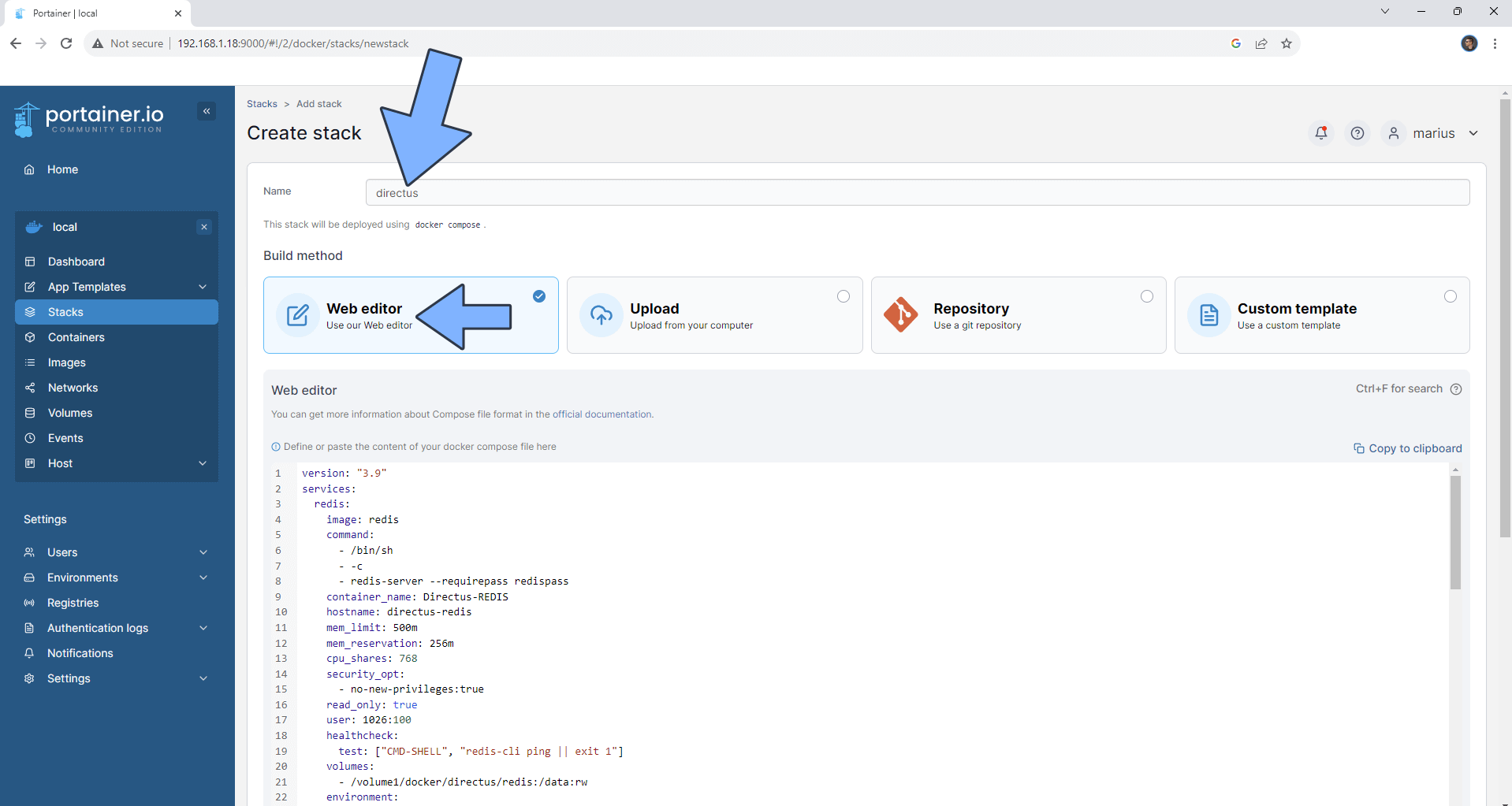
STEP 19
Scroll down on the page until you see a button named Deploy the stack. Click on it. Follow the instructions in the image below. The installation process can take up to a few minutes. It will depend on your Internet speed connection.
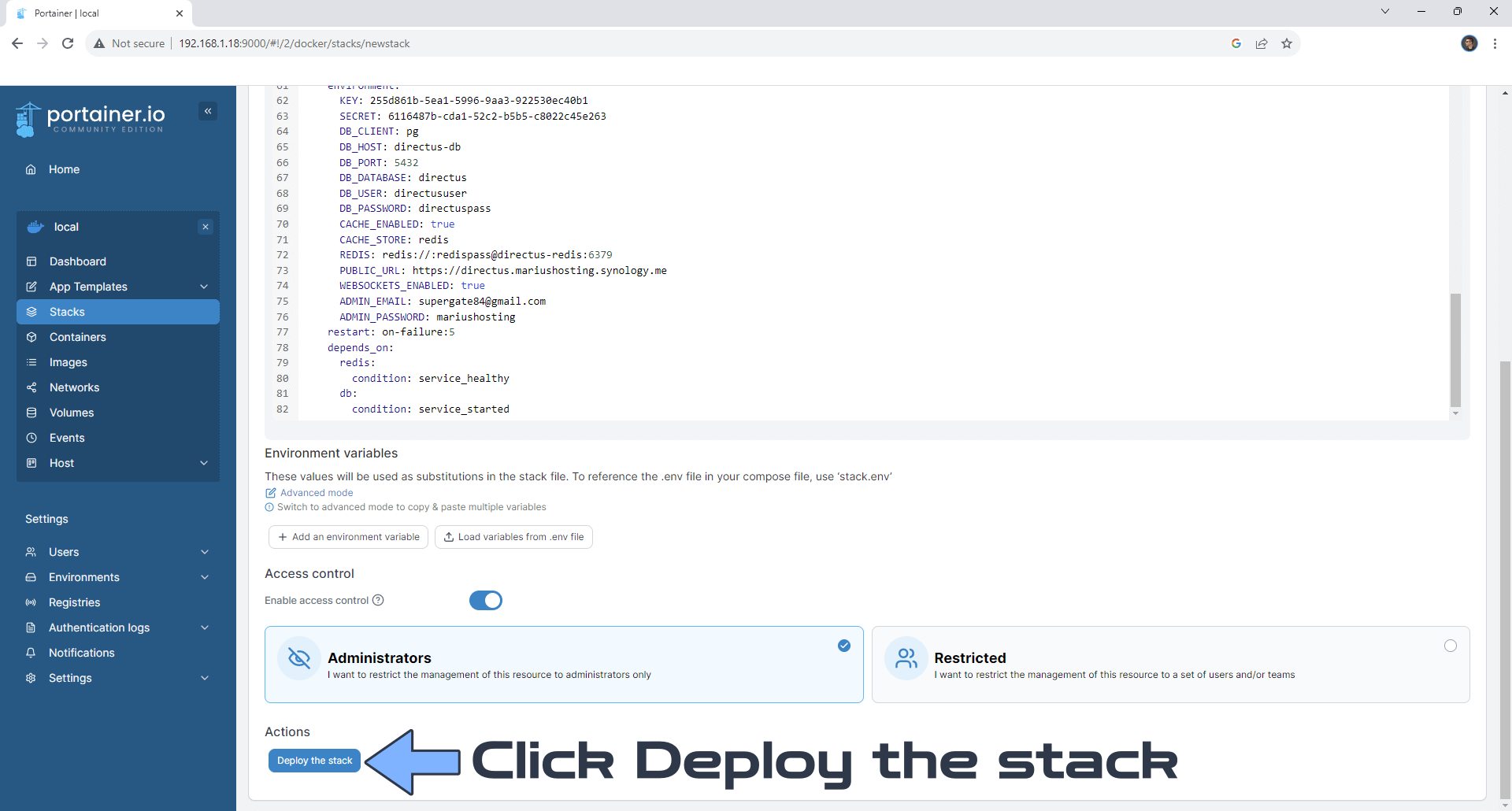
STEP 20
If everything goes right, you will see the following message at the top right of your screen: “Success Stack successfully deployed“.
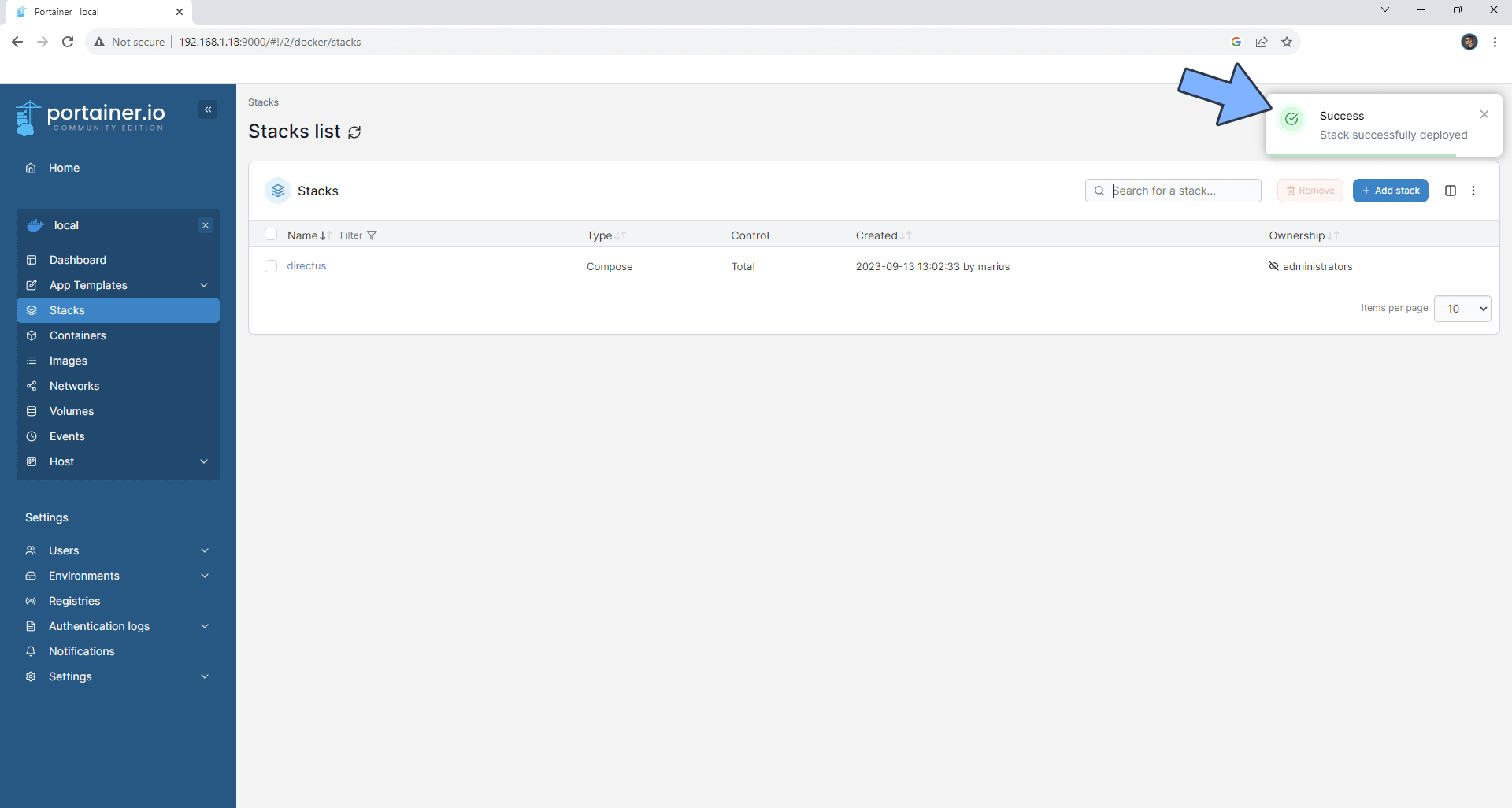
STEP 21
🟢Please Support My work by Making a Donation. Almost 99,9% of the people that install something using my guides forget to support my work, or just ignore STEP 1. I’ve been very honest about this aspect of my work since the beginning: I don’t run any ADS, I don’t require subscriptions, paid or otherwise, I don’t collect IPs, emails, and I don’t have any referral links from Amazon or other merchants. I also don’t have any POP-UPs or COOKIES. I have repeatedly been told over the years how much I have contributed to the community. It’s something I love doing and have been honest about my passion since the beginning. But I also Need The Community to Support me Back to be able to continue doing this work.
STEP 22
Now open your browser and type in your HTTPS/SSL certificate like this https://directus.yourname.synology.me In my case it’s https://directus.mariushosting.synology.me If everything goes right, you will see the Directus installation page. Type in your own ADMIN_EMAIL and ADMIN_PASSWORD that you have previously created at STEP 18 then click Sign In. Follow the instructions in the image below.
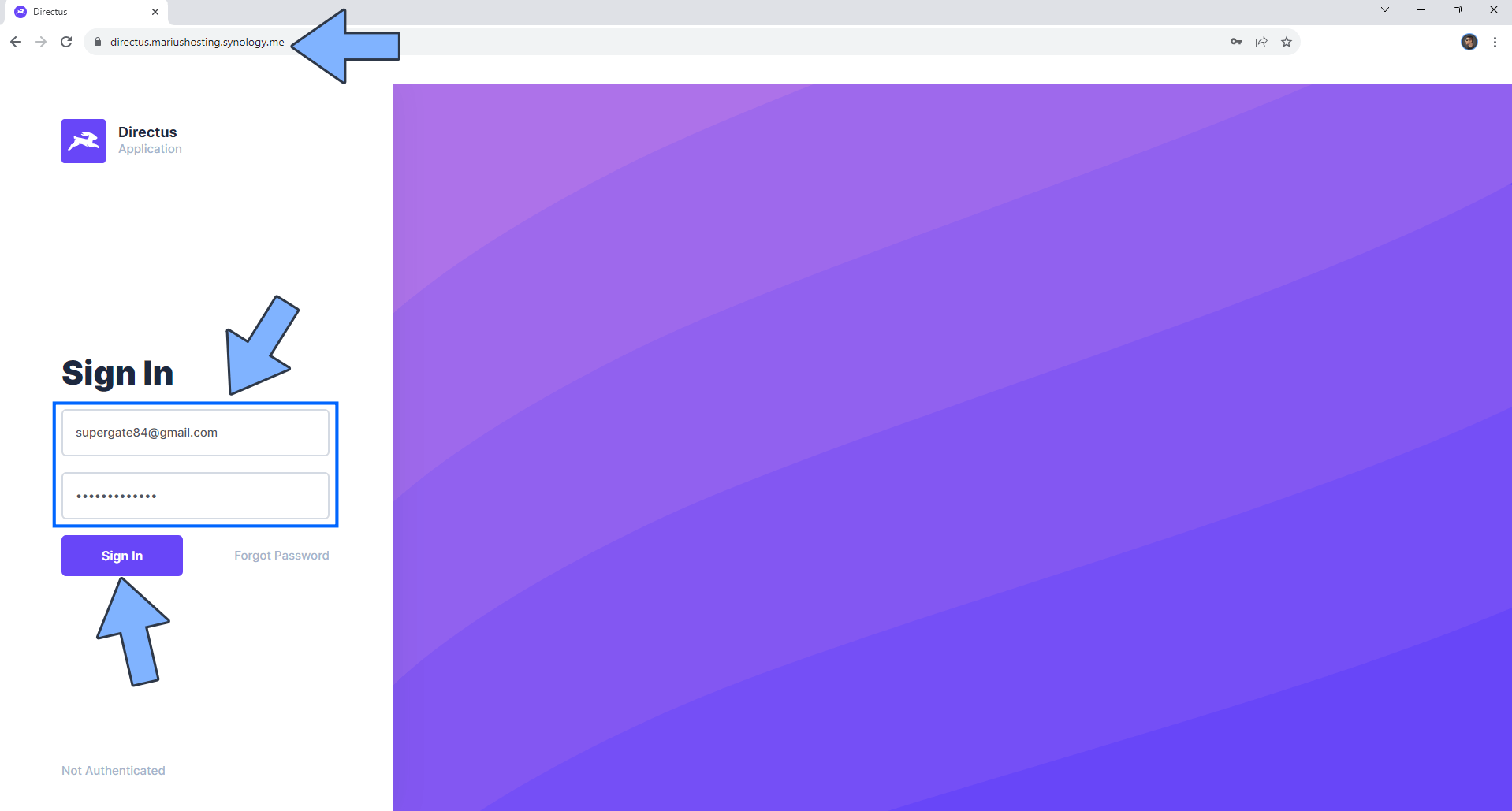
STEP 23
Your Directus dashboard at a glance!
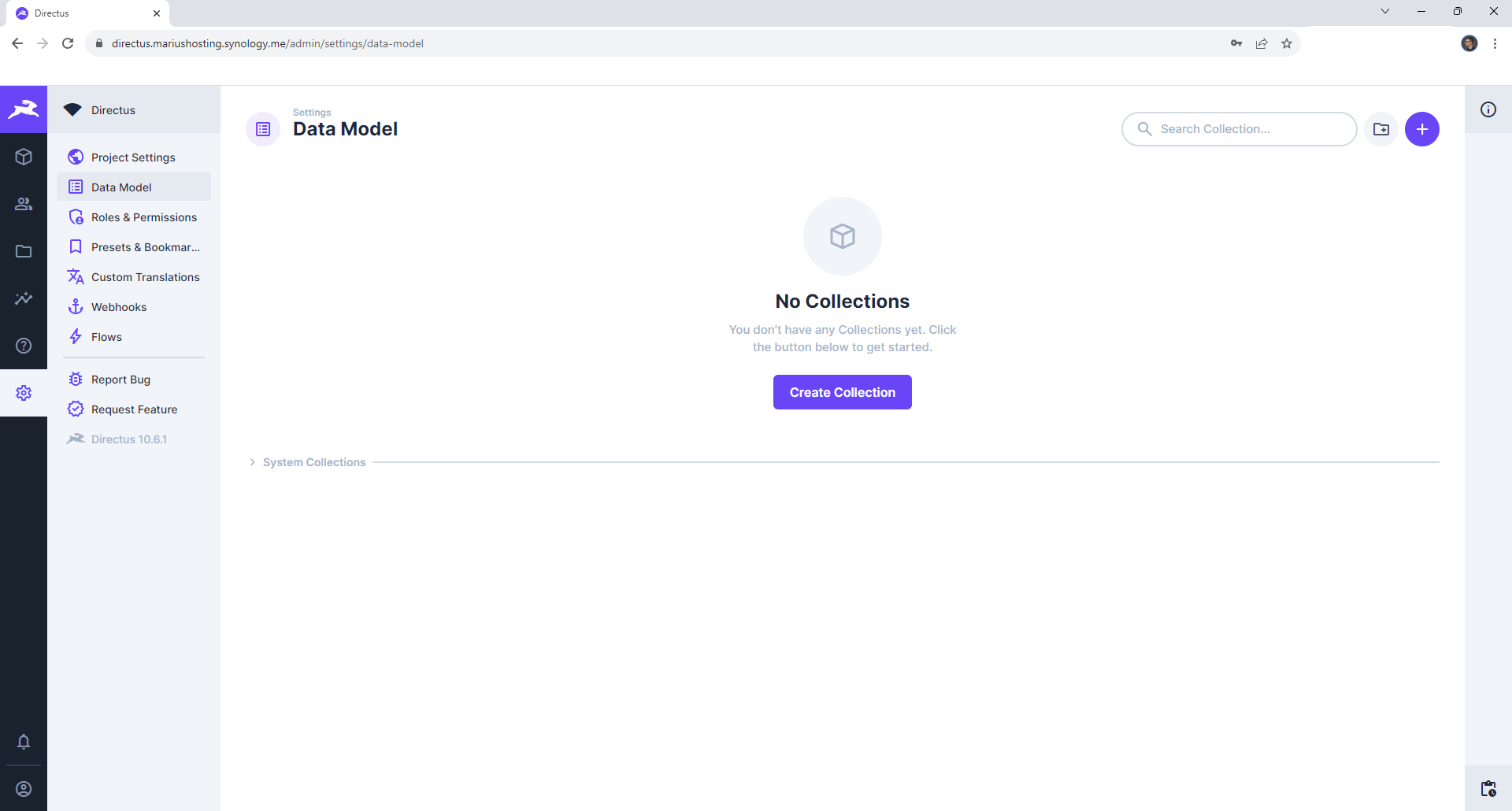
Enjoy Directus!
If you encounter issues by using this container, make sure to check out the Common Docker issues article.
Note: Directus Full Documentation.
Note: Can I run Docker on my Synology NAS? See the supported models.
Note: How to Back Up Docker Containers on your Synology NAS.
Note: Find out how to update the Directus container with the latest image.
Note: How to Free Disk Space on Your NAS if You Run Docker.
Note: How to Schedule Start & Stop For Docker Containers.
Note: How to Activate Email Notifications.
Note: How to Add Access Control Profile on Your NAS.
Note: How to Change Docker Containers Restart Policy.
Note: How to Use Docker Containers With VPN.
Note: Convert Docker Run Into Docker Compose.
Note: How to Clean Docker.
Note: How to Clean Docker Automatically.
Note: Best Practices When Using Docker and DDNS.
Note: Some Docker Containers Need WebSocket.
Note: Find out the Best NAS Models For Docker.
Note: Activate Gmail SMTP For Docker Containers.
This post was updated on Monday / January 20th, 2025 at 9:51 PM
